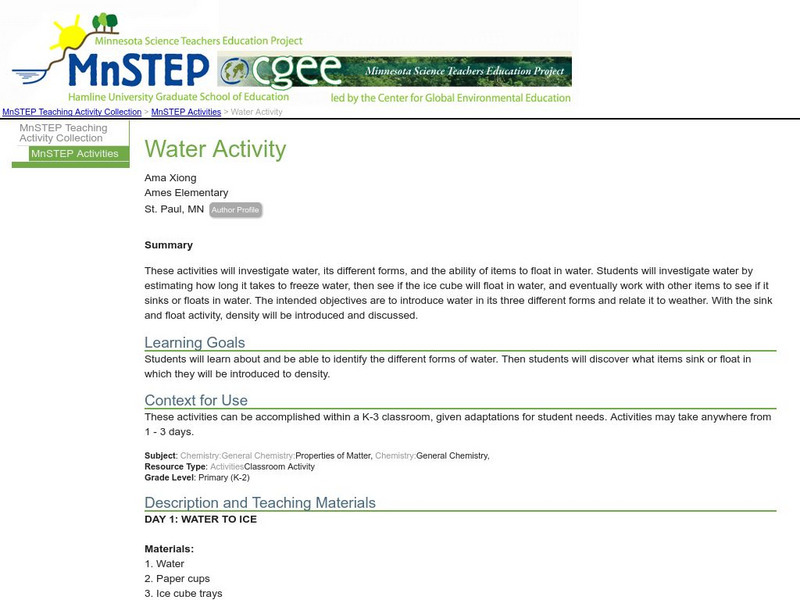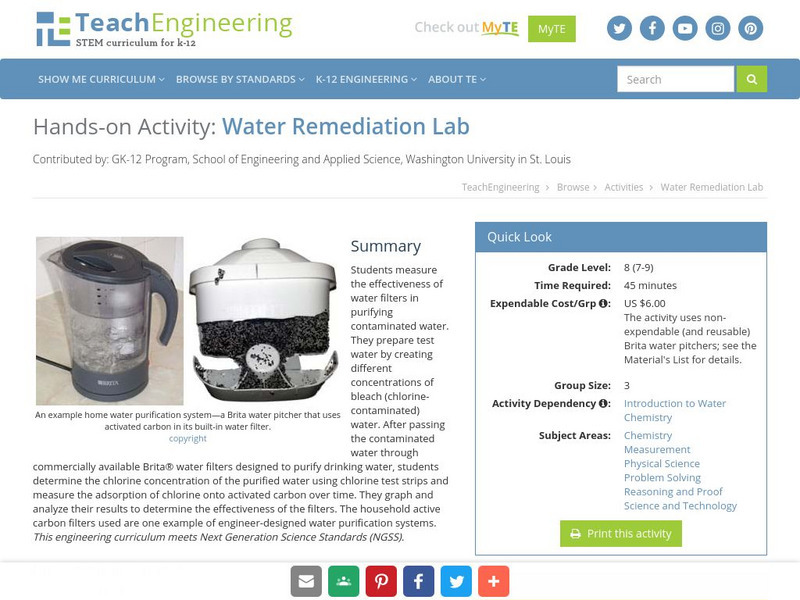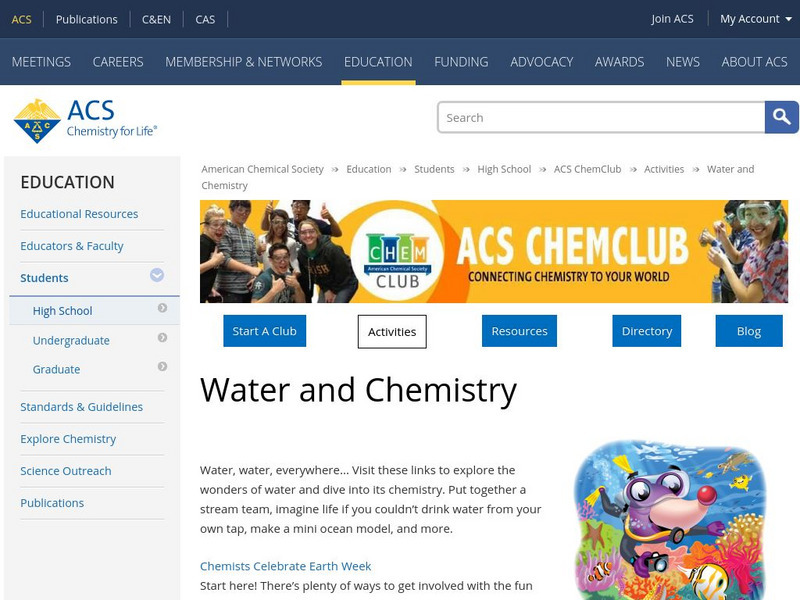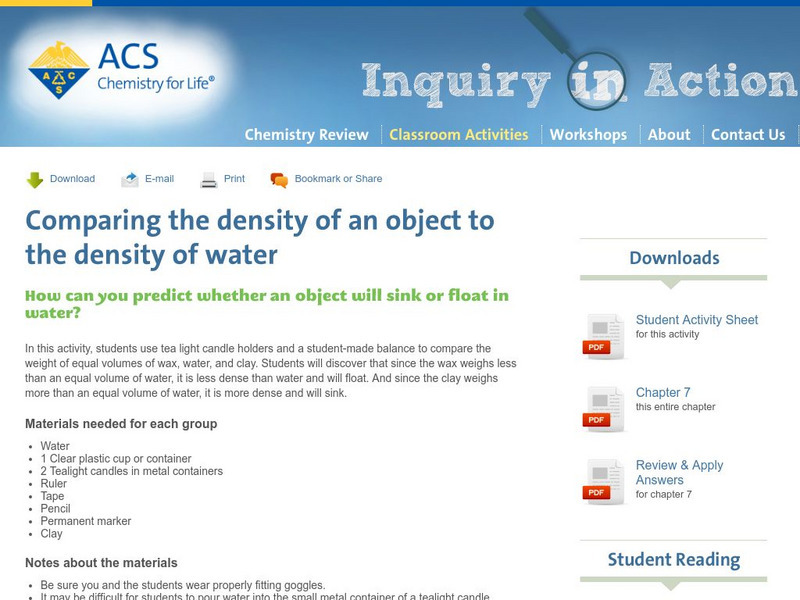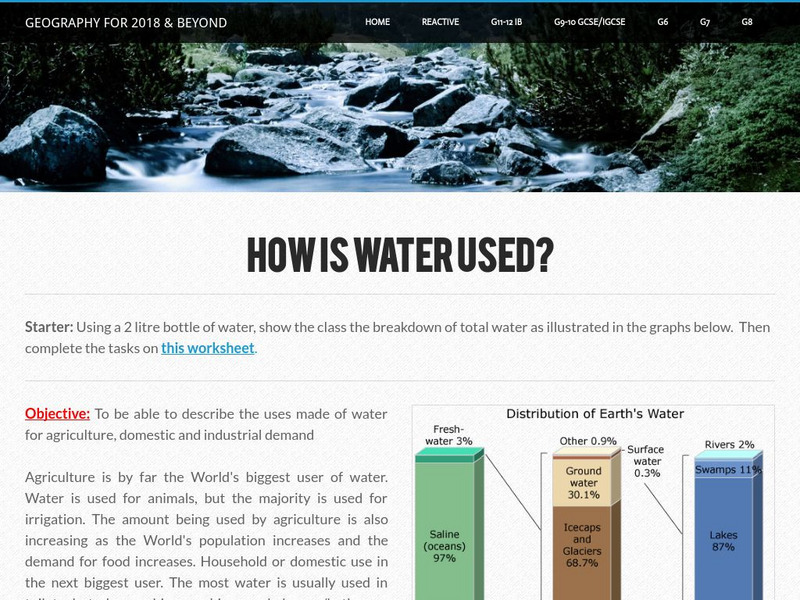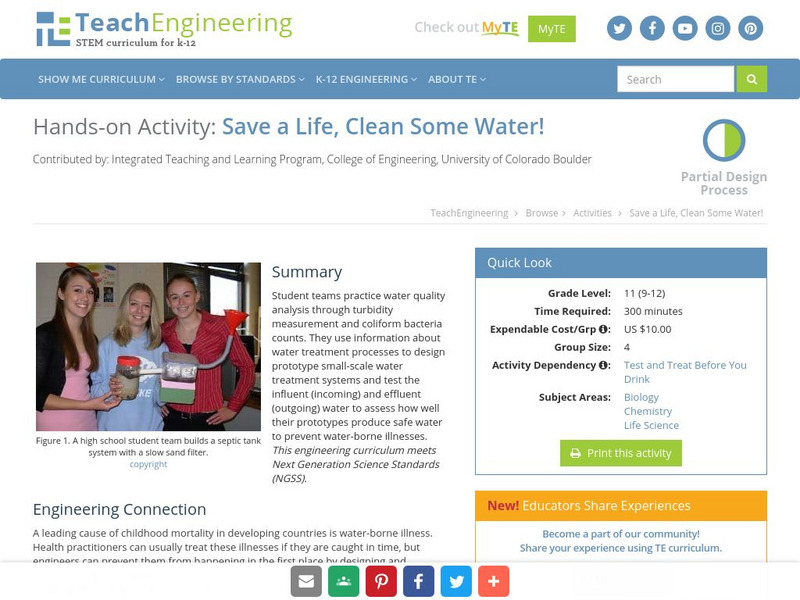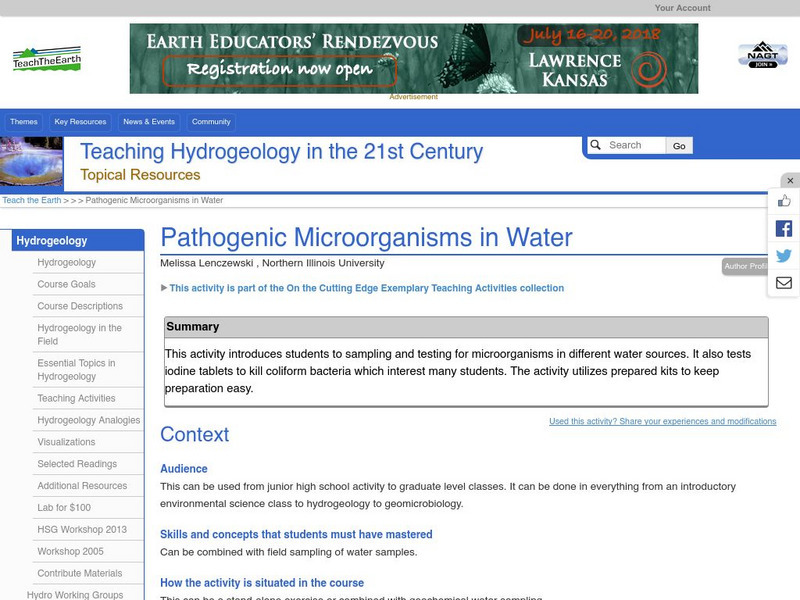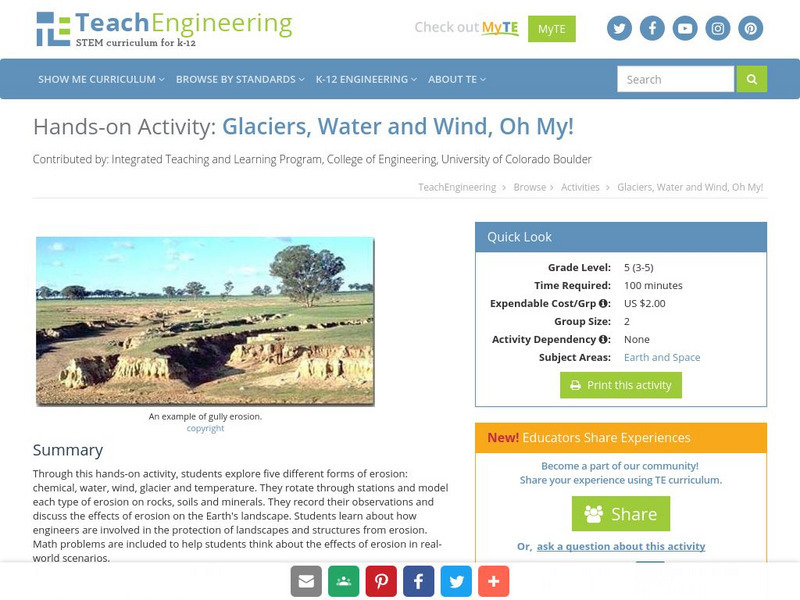Other
Usda: Virtual Labs: Controlling Water Activity in Food
In this science simulation, students investigate water activity in corn that has been dried using traditional Native American methods in order to learn about the best way to ensure food safety.
Other
Usda: Virtual Labs: Understanding Water Activity
In this science simulation, students investigate the behavior of water in food and how this can contribute to food spoilage.
US Geological Survey
Usgs: Water Science for Schools Activities Center
This website offers three activity centers: Questionnaires, Opinion Surveys, and Challenge Questions. Take a look at these interesting water research activities from the US Geological Survey. Click Home to access the site in Spanish.
US Geological Survey
U.s. Geological Survey: Water Science for Schools
A collection of resources--pictures, maps, data, glossary--about water and the water cycle.
Science Education Resource Center at Carleton College
Serc: Water Activity
Students investigate water by estimating how long it takes to freeze, then see if the ice cube will float in water, and eventually work with other items to see if they sink or float in water.
American Chemical Society
Inquiry in Action: Dissolving Different Liquids in Water
This activity will have students experimenting with whether all liquids dissolve in water. Activity includes both teacher and student instructions.
TeachEngineering
Teach Engineering: Water Remediation Lab
Students measure the effectiveness of water filters in purifying contaminated water. They prepare test water by creating different concentrations of bleach (chlorine-contaminated) water. After passing the contaminated water through...
TeachEngineering
Teach Engineering: How Much Water Do You Use?
Students keep track of their own water usage for one week, gaining an understanding of how much water is used for various everyday activities. They relate their own water usages to the average residents of imaginary Thirsty County, and...
Other
Derm: Water Cycles and Catchments
Students develop an understanding of the water cycle and water catchments. This learning module is divided into introductory, developmental, and culminating activities, and also has several assessment strategies. Resource sheets...
American Chemical Society
American Chemical Society: Explore Chemistry: Water and Chemistry
Explore water's unique properties in the activities here. Includes ideas for starting a chemistry club, ideas for Earth Day, articles, and videos.
TeachEngineering
Teach Engineering: Can You Catch the Water?
Students construct a three-dimensional model of a water catchment basin using everyday objects to create hills, mountains, valleys and water sources. They experiment to see where rain travels and collects, and survey water pathways to...
American Chemical Society
Inquiry in Action: Compare the Density of an Object to the Density of Water
In this activity, students use tea light candle holders and a student-made balance to compare the weight of equal volumes of wax, water, and clay. Students will discover that since the wax weighs less than an equal volume of water, it is...
Geographypods
Geographypods: Theme 3: Economic Development: Water Resources
This learning module looks at economic issues related to our water resources. Looks at how water is used by industry, the distribution and availability of water, water use footprint, domestic use of water, water shortages, and water...
TeachEngineering
Teach Engineering: The Dirty Water Project
In this activity, students investigate different methods (aeration and filtering) for removing pollutants from water. They will design and build their own water filters.
US Geological Survey
Usgs: Water Science Glossary of Terms
The United States Geological Survey offers a complete look at water science in glossary form. Take advantage of the topic guides at the top of the site. You'll find great maps, clipart and activities centers. Click Home to access the...
BioEd Online
Bio Ed Online: Water
The Science of Water Teacher's Guide provides a number of inquiry-based activities for grades 3-5 (although it can be expanded for other grades). The guide contains science lessons that enable students to explore water, behavior of...
TeachEngineering
Teach Engineering: Save a Life, Clean Some Water!
Student teams practice water quality analysis through turbidity measurement and coliform bacteria counts. They use information about water treatment processes to design prototype small-scale water treatment systems and test the influent...
BioEd Online
Bio Ed Online: Why Is Water So Important?
In this post assessment activity students review points covered in the attached unit and reach conclusions regarding the importance of water to human health. Student sheets are provided in English and in Spanish.
BioEd Online
Bio Ed Online: How Much Water Do Humans Need?
In this lesson plan students learn how much water is used and lost during a variety of common daily activities. Student sheets are provided in English and in Spanish.
Oxfam
Oxfam Education: Water
A great site from Oxfam which offers encourages critical thinking about water conservation through the use of pictures and student activities. Targeted to curriculum links for the United Kingdom, but information is certainly valuable and...
Science Education Resource Center at Carleton College
Serc: Pathogenic Microorganisms in Water
Use this lesson plan to introduce students to testing water sources for pathogenic microorganisms. Students will learn methods for groundwater sampling to evaluate water quality. Lesson plan includes student worksheets.
TeachEngineering
Teach Engineering: Gravity Fed Water System for Developing Communities
Students learn about water poverty and how water engineers can develop appropriate solutions to a problem that is plaguing nearly a sixth of the world's population. Students follow the engineering design process to design a gravity-fed...
TeachEngineering
Teach Engineering: Natural and Urban "Stormwater" Water Cycle Models
Students apply their understanding of the natural water cycle and the urban stormwater water cycle, as well as the processes involved in both cycles to hypothesize how the flow of water is affected by altering precipitation.
TeachEngineering
Teach Engineering: Glaciers, Water and Wind, Oh My!
This hands-on activity explores five different forms of erosion (chemical, water, wind, glacier and temperature). Students rotate through stations and model each type of erosion on rocks, soils and minerals. The students record their...
Other popular searches
- Water Cycle Activities K
- Activities on Water Sources
- Water Cycle Activities 3d
- Sand and Water Activities
- Pre K Water Activities
- Saving Water Activities
- Running Water Activities
- Recycled Water Activities
- Junior Water Activities
- Ocean Water Activities
- Prue K Water Activities
- Ocen Water Activities



